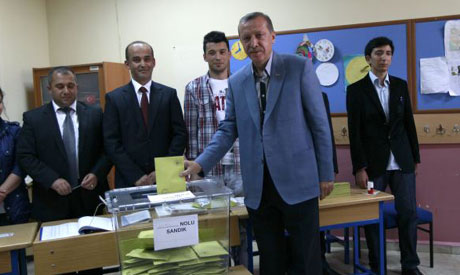
Turkey's Prime Minister Erdogan casts his vote at a polling station in Istanbul (Reuters)
Credited with Turkey's thriving economy, Prime Minister Recep Tayyip Erdogan's party was expected to cruise to victory with a minor loss of votes compared to its 47-percent showing in the 2007 elections, according to pollsters.
The lingering question is whether the AKP, in power since 2002, can secure an overwhelming parliamentary majority to press ahead with pledges to re-write Turkey's constitution, the legacy of a 1980 coup.
Among a population of some 73 million, more than 50 million were eligible to vote in almost 200,000 polling stations to renew the 550-seat parliament.
"My vote goes to the AKP -- for the services they have offered us... I can now go to any hospital, without having to queue," said Aydin, a 40-year-old tradesman.
He spoke at a school in Istanbul's Uskudar district, an AKP bastion, where a large crowd were waiting for Erdogan himself to vote.
Polling stations were to close at 1400 GMT and preliminary results were expected after 1800 GMT. The authorities generally allow the media to announce estimated results earlier.
Pollsters predict the AKP will take between 45 to 50 percent of the vote.
The AKP's enduring popularity owes mostly to economic sucess and improved public services following years of financial instability that haunted Turkey under shaky coalition governments in the past.
Under the AKP, gross domestic product grew by 8.9 percent in 2010, outpacing global recovery, and per capita income has doubled to $10,079.
His economic credentials may be sound, but Erdogan -- once the driving force of EU-sought reforms -- has come under fire for autocratic tendencies and growing intolerance to criticism.
With dozens of journalists in jail, the opposition is also alarmed over creeping restrictions on the Internet and an unprecedented outbreak of compromising wiretaps and videos of opposition figures circulating online.
Sex videos forced 10 top members of the Nationalist Action Party (MHP) to quit ahead of the polls, following a similar scandal last year that saw the veteran leader of the main opposition Republican People's Party (CHP) resign.
Led by a popular new chairman, Kemal Kilicdaroglu, the secularist centre-left CHP has built its election campaign on pledges of democratic reform, arguing the AKP is turning Turkey into a "police state."
CHP voters echoed similar concerns at the ballot boxes.
"Enough is enough. We are fed up of intimidation. I want a country where I can live without fear," Meryem, a teacher in her 40s, said in Ankara's upscale district of Cankaya.
The CHP, pollsters say, stands a chance of increasing its vote from 20 to nearly 30 percent, and help deny the AKP the strong majority it craves.
Erdogan has refused to say what the constitutional overhaul would entail and fanned speculation with his advocacy of a presidential system for Turkey -- presumably with himself at the helm.
The AKP needs at least 330 seats in the 550-strong house to amend the constitution without the support of other parties and put it to a referendum.
A two-thirds majority of 367 seats would enable the party to pass the amendments unilaterally.
Despite the sex tapes scandal, the MHP is expected to remain above the 10 percent threshold and enter parliament.
Candidates backed by the Kurdish Peace and Democracy Party but running as independents to circumvent the threshold are expected to increase their share from 20 seats to up to 30.
The AKP has also won credit for humbling the once-omnipotent army and raising Turkey's international profile, notably through closer ties with Arab countries.
But Turkey's bid to join the European Union is in limbo amid a row over Cyprus and opposition to its accession by some EU countries.
Short link: